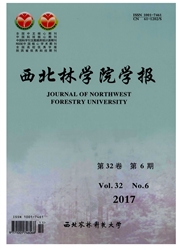

 中文摘要:
中文摘要:
根据上海共青森林公园水环境的试验分析数据,测算了监测指标变率,运用水质综合评价盲数模型对公园水质进行了评价,并对水环境问题进行了诊断。结果表明,(1)当前公园水质受到了旅游活动的较强影响,公园西部活动区水质为劣Ⅴ类,中部缓冲区Ⅳ类、Ⅴ类水质兼有,东部背景区水质则为Ⅳ类;(2)监测指标(NH3-N、COD、TP)的变率、公园的水质与园内旅游活动强度正相关,且在相同旅游强度的干扰下,监测指标中NH3-N响应最为敏感;(3)餐饮、住宿类旅游活动与行为极易引起NH3-N变化,而与娱乐活动相比,观赏休闲类旅游活动与行为则较易引起NH3-N、COD变化。此外,餐饮、住宿类旅游活动与行为对公园水质的影响,比其他休闲娱乐类的旅游活动与行为更为显著。
 英文摘要:
英文摘要:
According to the experiment data of water samples collected from Gongqing Forest rates of monitoring indicators were calculated and the water quality was evaluated through model with blind number parameters. The evaluation results of three areas showed that (1) of the park were seriously undermined by tourism activities, the water quality was in class V Park, change an evaluation water quality in activity area, and both class IV and V in buffer area, and class IV in background areal (2) the monitoring indicators (NH3-N, COD, and TP)were positively correlated with the intensities of tourism activities, as well as water quality, moreover, NH3-N was the most sensitive one among the monitoring indicators under the same intensity of tourism activities; (3) NH3-N of the water could be easily changed by activities of catering and lodging, and compared to the recreational activities, NH3-N and COD could be changed easier by leisure activities. In addition, quality of the water which was around activities of catering and lodging was impacted obviously than those around other activities.
 同期刊论文项目
同期刊论文项目
 同项目期刊论文
同项目期刊论文
 期刊信息
期刊信息
